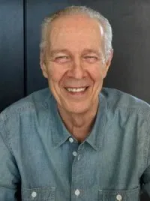.
.
photo © Brian McMillen
Ornette Coleman at the Great American Music Hall, San Francisco, October 29, 1981
.
___
.
…..Few figures in jazz music impacted the world of creative art quite like Fort Worth, Texas-born Ornette Coleman. The eminent jazz critic Martin Williams – an earlier admirer of Coleman’s – prophetically wrote in the liner notes to Ornette’s 1959 album The Shape of Jazz to Come that what Coleman is playing “will affect the whole character of jazz music profoundly and pervasively” and that “when we hear him he creates for our ears, hearts, and minds a new sensibility.” Maria Golia, author of the outstanding biography Ornette Coleman: The Territory and the Adventure, describes Coleman as “self-taught and proud,” who had a “nonconformist approach to music that attracted ridicule and censure” and who “used music to advance his self-understanding and in doing so, expanded the musical boundaries of the known.”
…..In the liner notes to Change of the Century, Coleman wrote that there is “no single right way to play jazz,” and that “the members of my group and I are now attempting a break-through to a new, freer conception of jazz, one that departs from all that is ‘standard’ and cliché in ‘modern’ jazz.” This philosophy and the astounding, adventurous music he created served to continually challenge the skeptical status quo, and made him a guiding light of the artistic avant-garde throughout a career spanning seven decades.
…..While Ornette is most famously remembered for his late 50’s/early 60’s recordings on the Atlantic label (among them The Shape of Jazz to Come, Change of the Century and Free Jazz), his first two recordings as leader were in the late 50’s on Contemporary Records, Lester Koenig’s Los Angeles-based label formed in 1951 that was known for recording musicians like Art Pepper, Shelly Manne, and Hampton Hawes who exemplified the style of playing known as “West Coast Jazz.” In an email exchange about Ornette with contributing writer Bob Hecht, he found this choice of labels “fascinating that a mainstream jazz label took the audacious move to launch the career of someone so different and controversial.”
…..This inspired Bob to revisit some of Ornette’s earliest work on Contemporary, and it also provoked him to do a deep-dive of his greatest tunes. “I have always thought he was a great composer of gem-like, ingenious, melodic compositions. And it is amazing to me how many piano players have covered his tunes, especially considering that except for his first album he almost never used a pianist!”
…..This deep-dive resulted in a sterling Spotify playlist Bob put together of 20 of Ornette’s tunes. The playlist alternates with a cover version of an Ornette composition – often by a pianist or other harmonically-based instrument – followed by Ornette’s original version. When Bob sent me the playlist, he wrote; “I think it gives a nice perspective on the beauty of his music, even for those who may not particularly be fans. Check it out if you are so inclined!” Spotify subscribers can do so by accessing the playlist below.
.
.
.
.
___
.
.

Bob Hecht frequently contributes his essays, photographs, interviews, playlists and personal stories to Jerry Jazz Musician. He has a long history of producing and hosting jazz radio programs; his former podcast series, The Joys of Jazz, was the 2019 Silver Medal winner in the New York Festivals Radio Awards.
.
.
___
.
.
.
Click here to read a Jerry Jazz Musician interview with Maria Golia, author of Ornette Coleman: The Territory and the Adventure
.
.
.

































